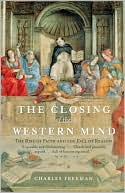

 |

|

The average rating for The Closing of the Western Mind: The Rise of Faith and the Fall of Reason based on 2 reviews is 3 stars.
Review # 1 was written on 2009-04-11 00:00:00 Michael Warner Michael WarnerThis book had been languishing on my shelf ever since I bought it in 2005. I think it was one of those broccoli books (which is really a misnomer since I freaking love broccoli)...books that you buy because they look like they'd be good for you rather than hedonistic romps. The Western Mind! Faith, Reason! It sounds like a mini-education! It is - and the book was an absolute pleasure to read, hard to put down. Freeman seems to be some kind of "freelance" historian - like a Barbara Tuchman, I guess - and he writes brilliantly. All is clear, coherent, beautifully explained, and the paragraphs and chapters flow into one another without resistance. He begins with ancient Greece (don't worry, he doesn't get that deep into the weeds as he only has 340 pp. to work with), Greek philosophy and Greek science, and the rationality of the Greek mind. Even though the Greeks got a lot of stuff wrong, science-wise, they had the right idea: look at things empirically, use the senses to figure out what might be going on. And of course this rationality coexisted with faith - pagan belief in gods. Then we come to Christianity. Jesus and Paul each get their own chapters. This book will be good background as I reread the New Testament. It's with Paul that we get the beginnings of the fall of reason: Paul is very anti-philosophy. Freeman goes into a lot of history on the Roman emperors and the church/state nexus, the eastern church vs. the western church, the results of the battles over doctrine, and how faith rather than reason won these battles. Augustine is a monumental figure here; he seemed to revere Paul but pay very little attention to Jesus, and the church moved further away from rationality. Freeman finishes up with Thomas Aquinas, who folds Aristotle into his theology and thus presages a return to a certain kind of reason and rationality. The endnotes are thorough and superb. There is an ample bibliography. |
Review # 2 was written on 2011-05-07 00:00:00 Rick French Rick FrenchThis book is a horrible travesty of historical reporting, but let me quote theologian David Bentley Hart who says it so well and with an appropriate amount of snark. "Freeman's is the old familiar story that Christianity is somehow to be blamed for a sudden retrogression in Western civilization that set back the cause of human progress by, say, a thousand years. Along the way, Freeman provides a few damning passages from the church fathers (always out of context and without any mention of the plentiful counterexamples found in the same authors), attempts long discourses on theological disputes he simply does not understand, continually falls prey to vulgar misconstruals of the materials he is attempting to interpret, makes large claims about early Christian belief that are simply false, offers vague assertions about philosophers he clearly has not studied, and delivers himself of opinions regarding Christian teaching that are worse than simply inaccurate." Hart has even more to say about Freeman's limited understanding of the history of natural science, but I will stop for now. (from Atheist Delusions, Yale University Press, 2009) |
CAN'T FIND WHAT YOU'RE LOOKING FOR? CLICK HERE!!!